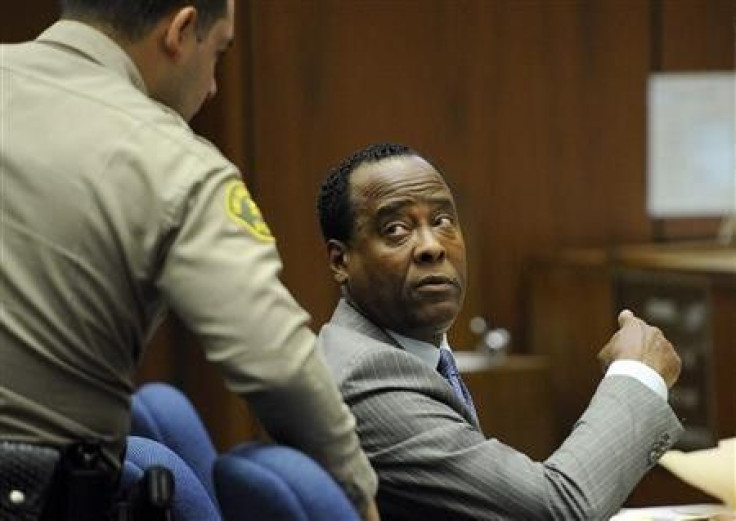Conrad Murray Found Guilty in Michael Jackson's Death

Michael Jackson's doctor, Conrad Murray, has been found guilty of involuntary manslaughter in the pop singer's 2009 death by an overdose of propofol, a powerful surgical anesthetic.
The jury of seven men and five women deliberated the fate of Murray, 58, for about nine hours over two days, giving him, ultimately, the lowest possible homicide offense, which carries a maximum sentence of four years in state prison and a minimum sentence of probation. He also faces the loss of his medical license.
Monday was the second day of deliberations. Jurors listened to 49 witnesses over 22 days of testimony. Murray did not testify. The case revolved around Jackson's inability to sleep without propofol, a hospitable grade drug, and a smattering of other drugs as he prepared for his This Is It concert tour.
Murray has contended that Jackson gave himself the fatal dose of propofol while the doctor was out of the room.
An attorney for Murray told jurors Thursday that his client would never have been put on trial if it were not for the king of pop's celebrity, the Los Angeles Times reported.
Somebody's got to say it: If it were anybody else but Michael Jackson, if it were anybody else, would this doctor be here today? defense attorney Ed Chernoff told jurors.
The trial started with a photo of a dead Jackson lying in a hospital bed and a shocking audio recording of the singer speaking unintelligibly.
Attorney David Walgren showed a photo of Jackson dancing at the Staples Center the night before his death and put the picture next to one of Jackson's lifeless body in a hospital bed.
What happened between that time and approximately 12 hours later when Michael Jackson is dead on June 25, 2009? Walgren asked. What you will learn through the evidence is that what happened during that time frame is that the acts and omissions of Michael Jackson's personal doctor, Conrad Murray, directly led to his premature death at the age of 50.
Walgren also played a recording of the heavily drugged and rambling pop star from about six weeks before his death.
When people leave my show, I want them to say, 'I've never seen nothing like this in my life,' the singer mumbled on a recording that was made on Murray's iPhone.
That is what Conrad Murray is seeing and observing on May 10, 2009, and what does he do with that knowledge and information? On May 12, he orders another shipment of propofol and midazolam, Walgren said.
Jackson was preparing for the 50-night comeback tour This Is It at the time of his death.
We have to be phenomenal... when people leave this show, when people leave my show, I want them to say I've never seen nothing like this in my life. Go. Go. I've never seen nothing like this. Go. It's amazing. He's the greatest entertainer in the world, he mumbles.
I'm taking that money, a million children, children's hospital the biggest in the world. Michael Jackson's Children's Hospital, Jackson says in the recording.
As Jackson's slurred voice echoed through the courtroom, his mother, Katherine Jackson, grew tearful. Biting her bottom lip, she removed her glasses to dry her eyes. She was joined in the courtroom by Jackson's father, Joe, and his famous siblings Janet, Latoya, Jermaine and Randy.
Murray, wearing a gray pinstriped suit, cried when his defense attorney, Ed Chernoff, delivered the defense's opening statement.
While Michael Jackson was frustrated because he could not sleep, frustrated because his doctor refused to give him a drug that hepreferred, that he wanted, he did an act without his doctor's knowledge, without his doctor's permission, Chernoff said.
He went on to claim that Jackson took a sedative and the final dose of propofol without Murray's knowledge. The sedative lorazepam coupled with the propofol created a perfect sorm in his body that killed him instantly, Chernoff said.
When Doctor Murray came into the room and found Michael Jackson, there was no CPR, there was no doctor, no paramedic, no machine that was going to revive Michael Jackson. He died so rapidly, so instantly, he didn't even have time to close his eyes, Chernoff said.
Part of the defense strategy, the Times reported, is, in effect, to put Jackson and his alleged addiction on trial.
The evidence is not going to show you that Michael Jackson died when Dr. Murray gave him propofol to sleep. What the evidence is going to show you is that Michael Jackson died when Dr. Murray stopped, he said.
© Copyright IBTimes 2024. All rights reserved.











